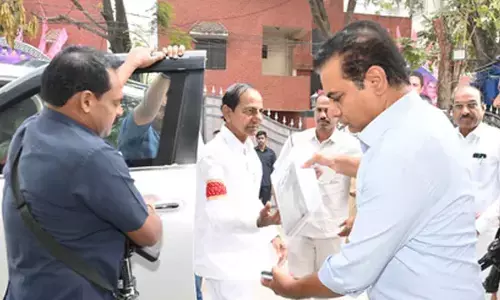Tribal farmers use ants and termites for help in cultivation

Tribal Farmers Use Ants and Termites for Help in Cultivation. Mulai Payeng, a 57 year old tribal farmer from the Kathino bari village in the Jorhat district in upper Assam expresses surprise when asked if the lack of irrigation facilities or the changes in the rainfall pattern is affecting his cultivation.
 Mulai Payeng, a 57 year old tribal farmer from the Kathino bari village in the Jorhat district in upper Assam expresses surprise when asked if the lack of irrigation facilities or the changes in the rainfall pattern is affecting his cultivation.
Mulai Payeng, a 57 year old tribal farmer from the Kathino bari village in the Jorhat district in upper Assam expresses surprise when asked if the lack of irrigation facilities or the changes in the rainfall pattern is affecting his cultivation.
Payeng belongs to the Mishing community.
According to state government data, presently over fifty percent of the irrigation projects are non functional in the state, and besides this environmentalists have pointed out that as a result of climate change and rampant destruction to the environment, there has been a change in the rainfall pattern which is affecting farmers in the state.
“Since a major portion of the state’s cultivable area is not covered under irrigation, farmers depend on the rain for their cultivation,” said Nilomoni Sen Deka, the state’s irrigation and agriculture minister.
This is however not a matter of worry for Payeng, who owes 3 hectares of cultivable land, and other tribal farmers in his village.
According to Payeng, he and his farmer friends from his village have never benefitted from the government’s irrigation schemes, and also said that though there has been a change in the rainfall pattern, their cultivation has never been affected.
On being asked the reason behind this, he said that he and others in his village has been using traditional knowledge which they have inherited from their forefathers, who were also farmers.
The traditional method which they use, is using ants and termites in their cultivable land, and Payeng said that it is a big help for the farmers.
“We release termites, ants, earthworms and insects to work the soil to a fertile condition every year, and it helps the farmers to a big extent,” said Payeng.
On being asked how it helps, Payeng said that, termites and ants are very good at improving the soil fertility.
“They burrow into the hard rocky surface making the soil porous and easy to plough," he said.
Payeng said that being stationed at a remote location, they could never benefit from government schemes include irrigation, but use of this traditional knowledge helped them to make the soil loose and porus.
“We have always been dependent on rain, and will also be dependent in the future, but this traditional knowledge helps us to make the soil soft and porous without the help of the rain, and so it is a big help when there is a delay in rain,” said Payeng.
Other tribal farmers from the village also presents similar stories, and said that they have never faced much problem as a result of the change in rainfall pattern, or the absence of government schemes for irrigation.
“We have been using this method for ages, and this has always helped us in our farming,” said Bikiron Pegu, a 44 year old farmer from the village who owes 3 hectares of land.
On being asked if they face any problem while using this method, Payeng said that ants, termites and earthworms are in abundance everywhere and so they never faced any problem in implementing this method.
“All we have to do is carry the ants, termites and worm in a bag, and release those in our field,” said Payeng.
The farmers also said that they have never faced any problem related to the production from the field.
“Our production from the field after using this method is similar to yield from the agriculture field in other parts of the state. So this clearly shows that this traditional method is farmer friendly,” said Pegu.
Agriculture experts pointed out that this method will be beneficial for farmers.
Ritu Thakur, of the North Eastern Regional Institute of Water and Land Management (NERIWALM), agreed with Payeng.
"Ants makes the soil arable and improve the quality physically, while termites improve the soil condition chemically by secreting certain enzymes," Thakur said.
Thakur also added that there is a need for an indepth study on the issue, and also for proper documentation of these traditional wisdom.
“Tribal people are known to live in harmony with the nature and have been doing so since hundreds of years, so there could be much more such important traditional wisdom. We need to document those,” said Thakur.














